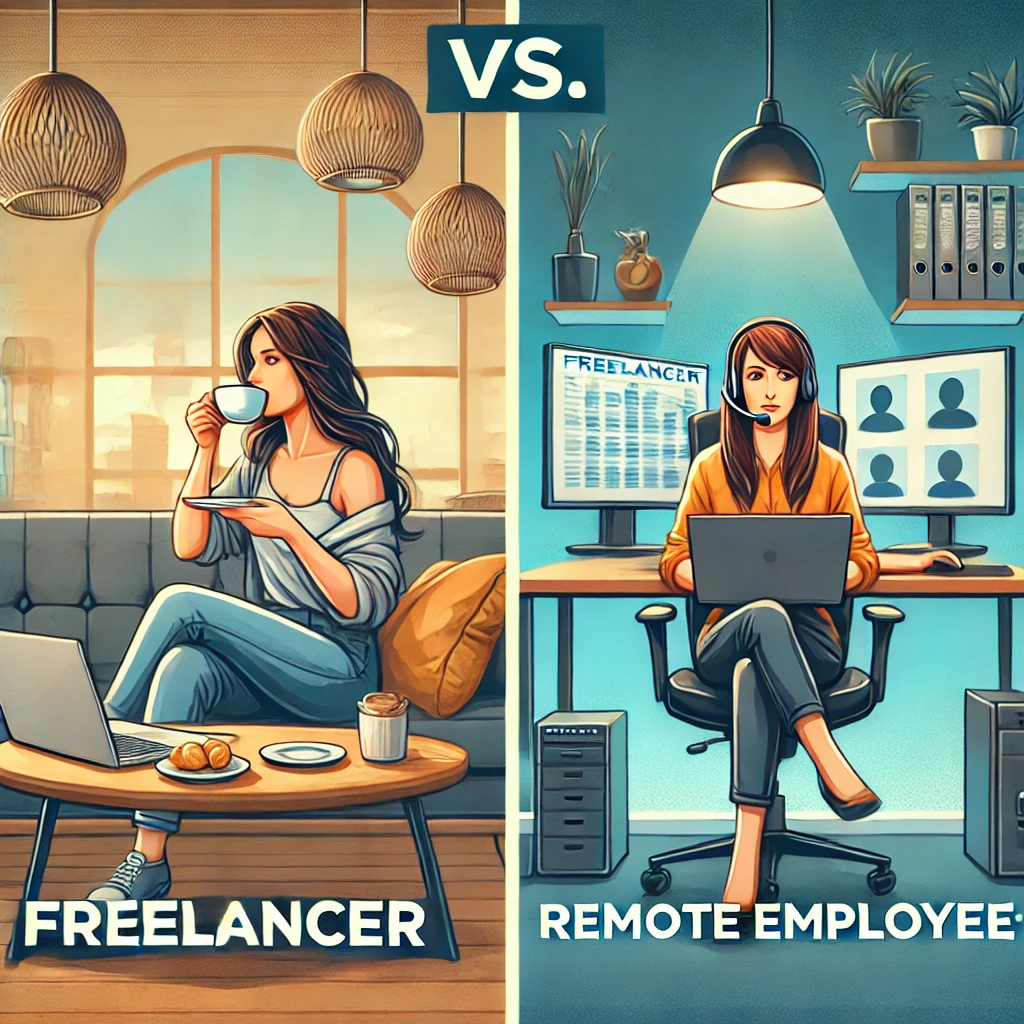Freelancer vs Remote Employee: Which One is Right for You?
As the modern work landscape continues to evolve, many professionals find themselves at a crossroads: should they pursue freelancing or opt for remote employment? While freelancer vs remote employee both options offer a degree of flexibility and freedom, they each come with their own unique advantages and challenges. Here’s a detailed, point-by-point breakdown to help you decide which path might be the best fit for your career goals.
1. What is a Freelancer?
A freelancer is a self-employed professional who works on a project-by-project basis for different clients. Instead of being tied to a single employer, freelancers can collaborate with multiple clients at once, offering their skills and services as needed. They manage their own taxes, client acquisition, invoicing, and overall business operations.
Pros of Freelancing
✅ Flexible Schedule – Work whenever and wherever you want.
✅ Higher Earning Potential – Set your own rates based on skills, expertise, and demand.
✅ Diverse Experience – Gain exposure to a wide range of industries and projects.
✅ Independence – No direct boss; full control over your workload and business decisions.
Cons of Freelancing
❌ Unstable Income – Earnings can vary greatly depending on client availability.
❌ No Employee Benefits – Health insurance, paid leave, and retirement plans must be self-arranged.
❌ Self-Management Challenges – Freelancers must juggle marketing, project management, client communications, and finances.
2. What is a Remote Employee?
A remote employee is a professional who works for a company but operates from a location outside the traditional office environment—often from home. While they enjoy flexibility in terms of location, they still function within a company’s structure, including set responsibilities, deadlines, and performance reviews.
Pros of Being a Remote Employee
✅ Stable Salary – Consistent pay provides financial security.
✅ Employee Benefits – Access to perks such as health insurance, paid vacations, and retirement savings plans.
✅ Career Development – Structured paths for growth, training programs, and promotion opportunities.
✅ Work-Life Balance – No commuting time, leading to more personal time and improved lifestyle.
Cons of Being a Remote Employee
❌ Less Flexibility – Need to follow company rules, schedules, and performance expectations.
❌ Limited Side Gigs – Some employers restrict taking up freelance projects outside your full-time job.
❌ Controlled Workload – Tasks are assigned by management, which may not always align with personal interests.
3. Key Differences Between Freelancer vs Remote Employee
a. Financial Stability
Freelancers often have higher earning potential but face unpredictable income patterns. In contrast, remote employees enjoy steady paychecks and job benefits, providing financial peace of mind.
b. Flexibility and Work Schedule
Freelancers have the ultimate freedom to decide when and where they work. Remote employees may enjoy flexible hours but still need to meet company expectations and deadlines.
c. Career Growth and Stability
Freelancers gain diverse skills but often lack a clear, structured growth path. Remote employees benefit from mentorship programs, promotions, and well-defined career ladders.
d. Work Responsibilities
Freelancers manage every aspect of their business — from client acquisition to project completion and accounting. Remote employees focus solely on their assigned tasks and contribute to broader team goals.
4. Which One Should You Choose?
Choose Freelancing If:
You value freedom and autonomy over stability.
You have strong self-motivation, organizational, and marketing skills.
You’re comfortable with fluctuating income and building a client base from scratch.
Choose Remote Employment If:
You prefer a steady paycheck and financial security.
You want employee benefits like healthcare and retirement plans.
You excel in organized settings with defined goals and growth opportunities.
5. Final Thoughts
Both freelancer vs remote employee offer rewarding career opportunities but cater to different professional needs and lifestyles. Some individuals even choose a hybrid approach—working remotely full-time while freelancing on the side for extra income and experience.
Ultimately, the best choice depends on your personal goals, risk appetite, and preferred work style. Take time to evaluate your priorities, long-term aspirations, and comfort with uncertainty before making your decision. Whichever path you choose, embracing the flexibility of today’s work environment can open doors to a fulfilling and successful career.


